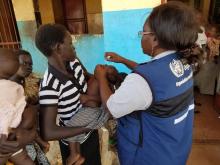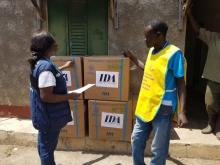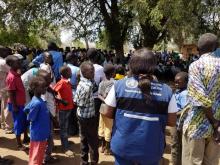WHO reaches returnees and displaced families with lifesaving supplies and services in the former Central Equatoria State of South Sudan
Juba, 15 February 2018 – WHO and partners are responding to an influx of more than 15 000 returnees from Uganda and internally displaced persons (IDPs) in Bungu, Kuli-Papa, Kagwada and Katigiri Counties, former Central Equatoria State South Sudan, since the influx was reported in late January 2018. The influx is stretching the existing humanitarian resources and primary health care services. Since clashes in mid-2016, humanitarian needs in the area have remained high.
To address the much needed health care services for the returnees and IDPs, WHO delivered urgently needed supplies and services as part of the joint United Nations, Government, National and Community Based Organizations convoy to save the lives of the vulnerable population. WHO’s support included three interagency emergency health kits (IEHK), IDSR tools (case-based, weekly surveillance notification forms) to Katigiri primary health care centers and Kuli-Papa primary health care units. The lifesaving supplies are enough to treat 30 000 people for the next three months.
In addition WHO’s response team conducted a rapid assessment to determine and address the key health needs. The team also vaccinated over 500 children under five years of age with measles, pentavalent, tetanus and oral polio vaccines to prevent a number of serious or even deadly diseases.
Funding for the supplies and operations comes from the generous donations of European Union Humanitarian Aid (ECHO), South Sudan Humanitarian Fund (SSHF), United States Agency for International Development (USAID) have enabled WHO to focus its support on delivering lifesaving supplies and services to the affected communities.
Since the beginning of the renewed violence in July 2016, Greater Equatoria Region has experienced a steady stream of armed incidents and violent clashes, says Dr Guracha Guyo, the WHO Emergency Coordinator. For months, insecurity has restricted humanitarian access to populations in surrounding areas, forcing people to desert their homes or villages. The mission conducted from 6 to 8 February 2018 is part of WHO’s emergency response plan, calibrated to provide affected areas with the much needed emergency health services, Dr Guyo emphasized.
The country is experiencing a complex emergency. Nearly five years after the emergence of civil conflict in December 2013, population displacement trends remain dynamic in a context of violence, rising food insecurity and economic instability.
The Greater Equatoria Region has been difficult to access to humanitarian assistance for several months, says Mr Evans Liyosi, WHO Representative a.i. to South Sudan. “Thanks to all involved parties, relief agencies will continue to provide lifesaving supplies and services to those affected by the conflict.”






